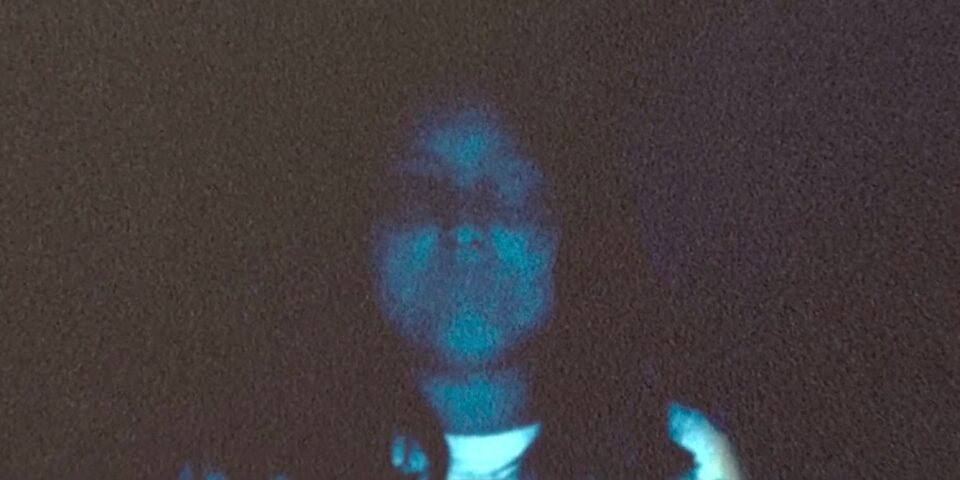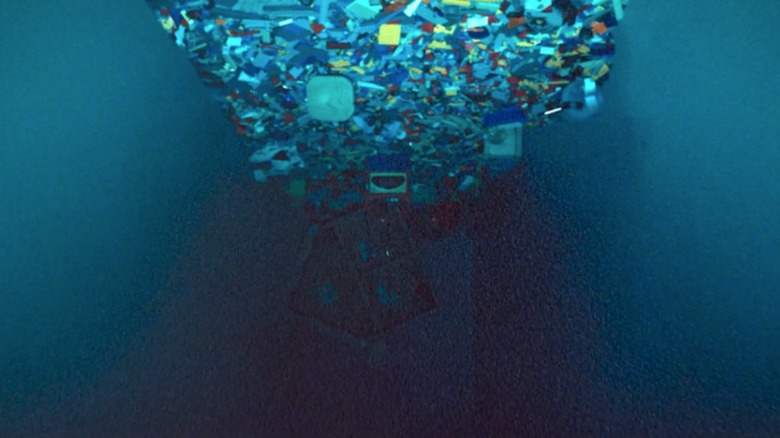Trapped in a Changing Home: How ‘Skinamarink’ Captures the Terror of Divorce Through a Child’s Eyes

Two scared children tiptoe through their house. The windows and doors have all disappeared. Their parents are nowhere to be found. Have they abandoned them? The only thing they know for sure is the terror squeezing their lungs…and the encroaching darkness threatening to swallow them whole.
In this house, Kyle Edward Ball’s Skinamarink presents a lo-fi nightmare in which young stars Kaylee (Dali Rose Tetreault) and Kevin (Lucas Paul) are trapped in their ever-evolving home with a sinister presence. The film has (rightfully) been applauded for its immersive atmospherics and home movie vibe which pulls viewers back into their deepest and darkest memories. The best horror movies do. Somewhere down there, it struck a painful chord I thought I had quit playing. The crumbling home. Vanishing parents. Strange new voices invading what used to be a comfortable space. Ghosts of the year my childhood died; The year my parent’s got divorced.
“Are you hiding?”
No film has better captured for me the frightening abandonment which children feel during divorce than Skinamarink. Kevin and Kaylee might as well have been my sister and me during those long nights when our parents wouldn’t come home. No note. No call. Just…gone. We’d stay up together, as Kevin and Kaylee do, wondering where they were. Afraid they might never come back. And oh, how cruel irony can be, because the few times they were home, we’d wish them gone so we wouldn’t have to hear them fighting. No kid should ever have to hear that. Every angry outburst becomes a bell tolling the end of childish innocence.
Skinamarink’s skeletal script has just enough meat on the bones to hint at a domestic disturbance that has begun to maul this family. An exhausted father (Ross Paul) emerges only a couple times, carrying defeat on his shoulders. Mom (Jaime Hill) isn’t around, nor do the kids want to talk about her. We didn’t want to talk about my mom either after she stopped coming home most nights. My sister and I were too young to understand she was off seeing the man that would later become my stepdad. We knew something was wrong. That was enough.
Our own dad couldn’t bear to look us in our worried eyes, so he stopped coming home, too. I spent days, weeks, months, asking myself what was happening. Did I do something wrong? Did I deserve this? No answers as the warm light of our house dimmed to cold shadows. The same darkness suffocates the setting of Skinamarink. It scares us because what we don’t know is always scarier than what we do. And being a kid who doesn’t know where your parents are…no monster is as terrifying as that.

“Where’s Dad?”
I find myself staring at Skinamarink’s poster as I write this. An image of one of the kids sitting in a hallway, everything turned upside down. And I’m thinking, that’s what it’s like when your family is torn apart like soft bread. Your whole life gets flipped on its head. You become aware of life’s indifference towards you. Ball’s film captures the essence of that tumultuous period through a home in which everything is displaced. Windows and doors disappear. Toilets are removed. Kaylee’s Barbie hangs from the ceiling. It’s like a filmic version of Mark Z. Danielewski’s House of Leaves, a home lost in a cosmic void between space and time.
One awful morning, I woke up to discover most of my dad’s things had vanished during the night. As if he’d never existed. Strange, how a moment like that doesn’t feel real, yet the reality of it stings like a hornet’s nest in your gut. The “how” and “why” of Skinamarink’s house don’t make sense because nothing does when you’re a child caught in the middle of a crumbling family. My parents weren’t there to tell me it would be all right. At least they didn’t lie to me.
I tried anything and everything to distract myself from the reality closing in. Horror movies and books, fantasies I could escape to—they became my solace. Kaylee and Kevin find their own coping mechanisms through cartoons and Legos. They fill their house with the comedic antics of animated characters to combat the unrelenting silence around them. The vast sound of nothing but the crackling of Skinamarink’s soundtrack encapsulates the despair which hangs overhead like a vampire bat, sucking the life from Kaylee and Kevin’s bodies. It’s a constant reminder that the joy which once filled this house has been replaced with the weary creaks and groans of a cracking foundation.
The Legos, meanwhile, are an unconscious effort to save it all from teetering over. Plastic buildings are built up in defiance of their changing environment. For every piece of their home that the insidious presence takes away, Kaylee and Kevin replace by building. And building. And building. Because if they stop, it might all come crashing down.
“Why is mom crying?”
While many have marveled at Ball’s ability to create horror out of suggestion—myself included—it’s not the limitless darkness or liminal spaces which most terrify me in Skinamarink. The film does a superb job of allowing our minds to wander through the blackness and imagine what’s hiding around the corner, in the closet, under the bed of the parent’s bedroom. But the scariest encounters come from the warped images of the family.
I became terrified of my parent’s erratic behavior during that time long ago. They weren’t physically violent, but they nonetheless devolved into monstrous doppelgängers of their former selves. That’s why Kaylee’s encounter with her mother strikes terror in me far deeper than that damn Fisher Price phone. Mom invites Kaylee into the bedroom with a soft whisper. It doesn’t feel right, but god, Kaylee wants this to be her mother, her real mom…the one she used to know. The featureless, angry thing which she encounters instead…my parents looked that way to me. I can’t ever un-see their phantom faces staring back at me during that endless year. Faces that didn’t know how to love each other—or me—anymore.
In the end, divorce plays the same game as Skinamarink‘s monster by distorting everything that used to bring you comfort as a kid.

“Put the knife in your eye.”
At some point, my mom started bringing the man she was seeing into our house. For a long time, he was nothing more than an unsettling voice rumbling through my walls. A stranger without a face. Ball recreates that fear of intruding strangers with the disembodied voice which haunts Kaylee and Kevin. Imagine the horror of that, having the person you’d never met and blamed for your family’s destruction, in your house without your parents around. I didn’t want to leave my room. What would happen if I didn’t do as they said, I’d wondered? Would the punishment be worse than the demand?
Perhaps Kevin stabs a knife through his eye as the thing commands because he’s scared of what it will do if he doesn’t. The shock of it. The blood splattered on the kitchen cabinet afterward. That’s the searing wound of being trapped inside with a presence you so desperately want to be gone. You want to scream. Cry. Run away. But you can’t at that age. There’s nowhere else to go. All of the doors and windows might as well have vanished.
Skinamarink isn’t just another horror film that gives you a few good scares and then leaves you be. It sits on your brain like a hunched ghoul, poking and prodding at the most sensitive areas of your childhood. I don’t know Ball’s history. I don’t know his story. But I know there’s a personal pain in this movie that reaches out and pulls you back into replaying the most devastating terrors of your own childhood.
I cried when I saw that image of the house tipped over in the final reel, all of the toys spilling out. I cried because I knew Kaylee and Kevin weren’t going to make it. I cried because I had just watched them experience similar horrors to what it took me years to get over. I cried because that image implies the exact moment in our lives when our childish innocence was tossed out and we were left with the grown-up knowledge of the darkness in the world, in our house, in ourselves.
In this house, Skinamarink takes us back to a time when we knew home would never be the same again.
Categorized: News
